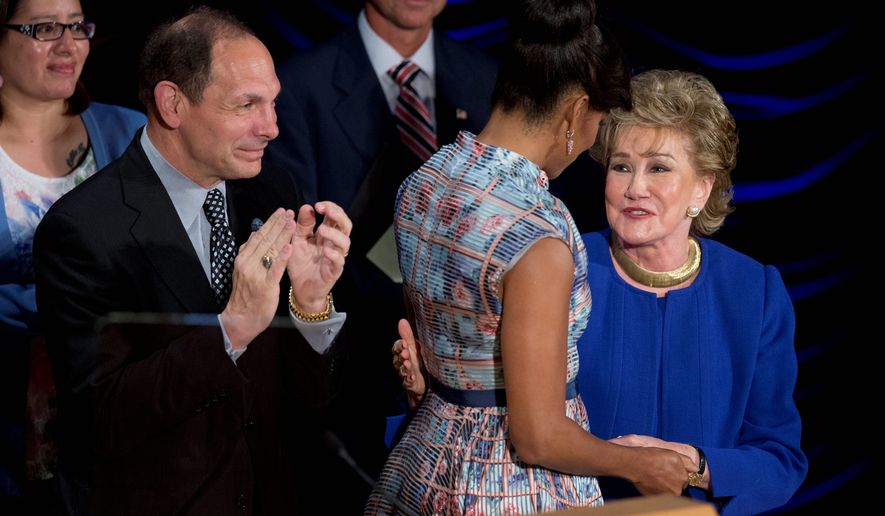Military caregivers say their faith is often what got them through the darkest times, and they urged religious leaders and advocates gathered on Capitol Hill on Thursday to help them out and learn more about the issue.
Former Sen. Elizabeth Dole made helping caregivers a priority after seeing their struggles firsthand when her husband was being treated at the Walter Reed Army Medical Center. She has been working with the Elizabeth Dole Foundation to help military families and said spiritual support is the primary service caregivers seek during stressful or difficult times.
About 5.5 million people nationwide are caring for injured veterans from all conflicts, according to a Rand Corp. study released last year. A caregiver often has to manage the veteran’s medical needs and handle the family’s finances and often cares for children as well. Some have to quit their jobs to provide care and manage household duties full time, but others are the family’s sole earner, Mrs. Dole said.
Attendees at Thursday’s event said that when Mrs. Dole asks for a favor, the only answer is “yes.” She has used that persuasiveness to bring together big names from across the political spectrum to talk about the importance of supporting those who care for veterans.
During the weeklong salute to caregivers, Mrs. Dole held events around Washington with first lady Michelle Obama, Veterans Affairs Secretary Robert McDonald and businessman and possible presidential contender Donald Trump.
Pastor Joel Osteen said at the Capitol Hill event that he didn’t know, before speaking with Mrs. Dole, about the specific issues facing those who care for wounded veterans.
“We help the military, we help wounded warriors. That’s pretty obvious. But I wasn’t aware of our caregivers,” he said.
Mr. Osteen, pastor of Lakewood Church in Houston and a best-selling inspirational author, urged other religious leaders to learn more about the struggles of caregivers and what they can do to help, even if it’s something as simple as picking up groceries or mowing the lawn.
“Sometimes we think we have to go preach this big sermon, but we can all do these simple things, and I think that’s what in the faith community we can commit to do,” he said.
Sonia Alvarado, a United Methodist pastor, said her faith was shaken when her son, Army Sgt. Luis Alvarado, was injured in Afghanistan in 2011, as she wondered, “How can God let this happen?”
Doctors told her that her son had only days to live, but Ms. Alvarado said she recommitted to her faith and let God do his work. Now, more than three years later, Sgt. Alvarado is doing better than any in the medical community expected.
“As caregivers, it’s important to have faith,” she said. “The alternative is fear.”
A Rand Corp. survey from 2014 found that more than 50 organizations offered some type of social or “helping hand” support, but only four provided religious support to caregivers.
Despite that, religious support is the most used of the services by post-9/11 caregivers, even more than patient advocate help or financial stipends. The survey showed that 33 percent reported the use of some type of religious assistance during the year.
Leaders of the bipartisan, bicameral Hidden Heroes Congressional Caucus for Military and Veteran Caregivers also attended the event and vowed to do more on Capitol Hill to raise awareness and provide services for caregivers.
“We are depending on you to take care of them and you should depend on us to take care of you,” said Rep. Jeff Miller, Florida Republican and co-chairman of the caucus.
Under current law, caregivers to post-9/11 veterans receive benefits such as monthly stipends, coverage of travel expenses when accompanying a veteran to undergo care, and mental health services and counseling for themselves, according to a Veterans Affairs website on caregiver services. Those who care for veterans injured in other conflicts, however, aren’t afforded many of these services.
Senators introduced in April a bill to expand services to caregivers for veterans of all eras.
Sen. Patty Murray, Washington Democrat; Rep. James R. Langevin, Rhode Island Democrat; and Sen. Susan M. Collins, Maine Republican, introduced the proposal, which also would make the program more inclusive of mental health injuries, let veterans transfer their GI Bill benefits to dependents and provide help with child care, financial advice and legal counseling, according to a statement from Ms. Murray.
“While military caregivers don’t necessarily wear uniforms or go overseas, they absolutely serve our country and we should support these hidden heroes by doing whatever we can to make their lives a bit easier,” she said in a statement.
The Washington Times has been running a monthlong advertising series on wounded-warrior caregivers during May.
• Jacqueline Klimas can be reached at jklimas@washingtontimes.com.




Please read our comment policy before commenting.